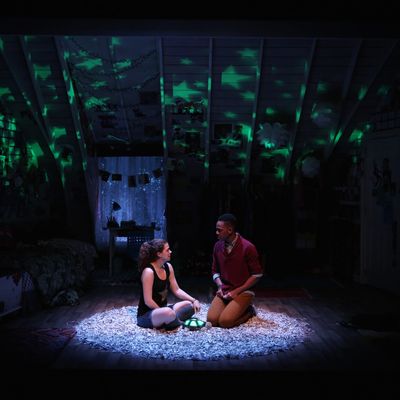
Every year, American Theatre magazine publishes a list of the country’s most-produced playwrights. It makes sense that Ayad Akhtar topped the latest edition: His award-winning plays, many performed in New York and one (Disgraced) on Broadway, are compelling and topical and fairly easy to mount. Familiar names including August Wilson, Tennessee Williams, and Arthur Miller (in his centenary year) filled out most of the rest of the top ten — except for a writer, tied for seventh spot with John Patrick Shanley, I’d never heard of before: Lauren Gunderson. Based in California, Gunderson has several plays in active circulation; they’ve had a total of more than 70 productions around the country in the last few years, virtually none here. That anomaly has now been corrected with the arrival at 59E59 of her most popular work, the 2011 drama I and You, in a production from the Merrimack Repertory Theatre of Lowell, Massachusetts. I’m not sure which is more dispiriting: the play itself or what it says about the theatrical scene in the hinterlands.
That’s the kind of statement that gives New York Values a sniffy bad name, as if we believed that plays popular anywhere else must be revealed as dimwitted here. But I and You isn’t at all dumb — rather, it tries too hard, like the two teenagers who are its only characters, to wear its intelligence insouciantly. Caroline is a romantic shut-in posing as a smart-ass; her pose is meant to be justified by the fact that she suffers from an unspecified liver disease that requires her to wait, in near isolation, for a transplant donor to die. Anthony is her high school’s golden boy: smart and athletic but attractively geeky and with a fondness for poetry. When he arrives unannounced in Caroline’s bedroom to collaborate on an English project due the next day (the details are sketchy in both senses of the word) the two begin an approach-avoidance dance of mutual interest that might be charming if it weren’t so predigested. He turns her on to Whitman: The project is about the use of pronouns in Leaves of Grass. (Hence the play’s title.) She sasses him for not knowing where the liver is, and shows him. The cute factor is very high, competing to curdle your attention with the exaggerated teen-speak. (“Why are you doing anything in my room, in my house right now, guy I don’t know, what the hell?”) And if the whiff of insincerity in the dialog and plotting isn’t enough to turn you off — Gunderson dispenses pellets of conflict at regular intervals, as if feeding a hamster — a wrench of a surprise thrown at us five minutes before the end renders everything that came before it moot. What we were supposed to care about is not what’s really been going on; I and You is a classic bait-and-switch, with about as much profit to the hapless audience.
It’s easy to see why it gets produced so much. With just the two characters, a unit set, and chewy roles for two young actors — he’s black, she’s white — it ticks a lot of boxes on a theater scheduler’s to do list. It’s also, just faintly, possible to see why it was a finalist for the vastly prestigious Susan Smith Blackburn Prize two years ago: Its seriousness and teen-relatability come self-endorsed with hat-tips not only to Whitman, but also to Coltrane, Facebook, Jerry Lee Lewis, and Pop-Tarts. Even the plot twist does its bit, keeping the play narratively “unstable” in the currently fashionable manner and providing a juicy topic for the inevitable post-show talkbacks. (Discuss Gunderson’s use of Whitman’s line “For every atom belonging to me as good belongs to you.”)
But none of this overrides the play’s pervasively synthetic conception. In borrowing an idea of teenage angst from “problem” movies, it diminishes the real perils teenagers face; in borrowing a coup de théâtre from countless metaphysical mysteries, it dilutes the intellectual power of theater. (This production, directed by Sean Daniels and featuring Kayla Ferguson and Reggie D. White, only exaggerates those failings; every obstacle and intention is underlined as if with a fluorescent highlighting pen.) It’s not so much bad as false. As such, I have to believe that a play like I and You is popular mostly in places where there isn’t much choice of product. The options are often just as dispiriting here in New York, but there are so many more of them.
I and You is at 59E59 through February 28.




